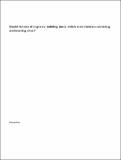Por favor, use este identificador para citar o enlazar a este item:
http://hdl.handle.net/10261/61990COMPARTIR / EXPORTAR:
 SHARE SHARE
 CORE
BASE CORE
BASE
|
|
| Visualizar otros formatos: MARC | Dublin Core | RDF | ORE | MODS | METS | DIDL | DATACITE | |

| Campo DC | Valor | Lengua/Idioma |
|---|---|---|
| dc.contributor.author | Amat, Juan A. | - |
| dc.date.accessioned | 2012-12-05T09:47:30Z | - |
| dc.date.available | 2012-12-05T09:47:30Z | - |
| dc.date.issued | 2006 | - |
| dc.identifier | doi: 10.1007/s10164-005-0184-0 | - |
| dc.identifier | issn: 0289-0771 | - |
| dc.identifier.citation | Journal of Ethology 24: 297- 300 (2006) | - |
| dc.identifier.uri | http://hdl.handle.net/10261/61990 | - |
| dc.description.abstract | Pairing of northern hemisphere dabbling ducks normally occurs in wintering sites. Mate choice occurs when some individuals congregate in courtship parties, in which females mainly choose mates according to male behavioural dominance. The sex ratio of some species is more male-biased at northern than at southern wintering sites, and the age ratio is adult-biased in northern areas. A possible mechanism responsible for this spatial segregation of sex and age classes is behavioural dominance, with males usually dominating females and adults dominating yearlings. Due to this latitudinal segregation of sexes during winter, presumably more males would remain unpaired in northern sites utilized by the more dominant birds than in southern sites utilized by the less-dominant birds, and this is paradoxical. I argue that some females having wintered and paired in southern sites may switch mates at stopover sites during northward migration. This hypothesis provides an explanation as to why, in spite of females being paired when initiating northward migration, some species show an increase in courtship activity during spring at stopover sites, as in common teals (Anas crecca) in southern Spain. In contrast, populations that do not migrate, e.g. mallards (A. platyrhynchos) in southern Spain, do not exhibit an increase in courtship activity during spring. © Japan Ethological Society and Springer-Verlag 2005. | - |
| dc.language.iso | eng | - |
| dc.publisher | Springer Nature | - |
| dc.rights | openAccess | - |
| dc.title | Should females of migratory dabbling ducks switch mates between wintering and breeding sites? | - |
| dc.type | artículo | - |
| dc.identifier.doi | 10.1007/s10164-005-0184-0 | - |
| dc.date.updated | 2012-12-05T09:47:30Z | - |
| dc.description.version | Peer Reviewed | - |
| dc.type.coar | http://purl.org/coar/resource_type/c_6501 | es_ES |
| item.fulltext | With Fulltext | - |
| item.openairecristype | http://purl.org/coar/resource_type/c_18cf | - |
| item.cerifentitytype | Publications | - |
| item.openairetype | artículo | - |
| item.grantfulltext | open | - |
| item.languageiso639-1 | en | - |
| Aparece en las colecciones: | (EBD) Artículos | |
Ficheros en este ítem:
| Fichero | Descripción | Tamaño | Formato | |
|---|---|---|---|---|
| jethol.pdf | 90,56 kB | Adobe PDF |  Visualizar/Abrir |
CORE Recommender
SCOPUSTM
Citations
1
checked on 13-abr-2024
WEB OF SCIENCETM
Citations
1
checked on 23-feb-2024
Page view(s)
290
checked on 22-abr-2024
Download(s)
293
checked on 22-abr-2024
Google ScholarTM
Check
Altmetric
Altmetric
NOTA: Los ítems de Digital.CSIC están protegidos por copyright, con todos los derechos reservados, a menos que se indique lo contrario.
